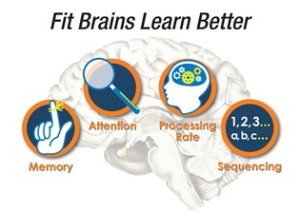 I have been exposed to the Fast ForWord® program for several years. I was introduced to the program during my Clinical Fellowship (first year of work after grad school). I worked at a private practice in Pasadena, CA. The owner of the private practice was a veteran in implementing the program and used it with a wide variety of students with disabilities ranging from mild auditory processing to severe autism. My first reaction on viewing the program was skepticism. How can any computer program take the place of a real, live clinician? How can sitting in front of a computer for an hour a day fix all the language and learning problems? Now, 12 years later, as an owner of a private practice and a Fast ForWord provider, my perspective hasn’t really changed. Fast ForWord cannot (and wasn’t designed to) take the place of a therapist, nor can it truly “fix” all language and learning challenges. So perhaps, it is more productive to look at what it was really meant to do, and then decide if it truly does work.
I have been exposed to the Fast ForWord® program for several years. I was introduced to the program during my Clinical Fellowship (first year of work after grad school). I worked at a private practice in Pasadena, CA. The owner of the private practice was a veteran in implementing the program and used it with a wide variety of students with disabilities ranging from mild auditory processing to severe autism. My first reaction on viewing the program was skepticism. How can any computer program take the place of a real, live clinician? How can sitting in front of a computer for an hour a day fix all the language and learning problems? Now, 12 years later, as an owner of a private practice and a Fast ForWord provider, my perspective hasn’t really changed. Fast ForWord cannot (and wasn’t designed to) take the place of a therapist, nor can it truly “fix” all language and learning challenges. So perhaps, it is more productive to look at what it was really meant to do, and then decide if it truly does work.
According to Dr. Martha Burns, language processing can be broadly divided into three hierarchical levels: Low Level (Perceptual Skills or Listening skills), Mid Level (Grammar and Vocabulary), and High Level (Complex Problem Solving). If the three levels are viewed as a pyramid, the Perceptual skills would form the base, Grammar and Vocabulary skills would form the middle portion, and Problem Solving skills would form the tip of the pyramid. As you can imagine a shaky foundation or base could potentially cause the entire pyramid to fall. Our ability to quickly perceive (listen to) sounds, tell if two sounds are same or different, put sounds together to form words, and also manipulate sounds to change words and their meanings is truly the foundation of language. Several conditions in young children can lead to impairments in these Low Level processing skills. Autism, ADD, ADHD, middle ear infections, and seizures are only a few conditions that lead to these impairments. The goal of the Fast ForWord programs, therefore, is not repair high-level problem solving skills, or even to teach grammar and vocabulary. The primary focus of Fast ForWord is to enable a child to perceive miniscule changes in speech sounds that occur at a rapid rate during spontaneous conversation or classroom lessons. Of course, this may result in changes in mid- and high-level processing, but these changes are a product of the progress seen in low-level processing. However, this does not eliminate the need for more traditional individual therapy to work on grammar, expanding vocabulary, and problem solving. In fact, Fast ForWord may make traditional behavioral approaches more effective and productive.
One of the criticisms of Fast ForWord has been that a clinician can target the areas addressed by Fast ForWord. Traditional auditory processing therapy focuses on skills such as following directions, phonological awareness, and auditory recall. While Fast ForWord targets the same areas, traditional approaches are merely asking the child to do things that are already challenging for him without making any modifications to the stimulus. Clinicians attempt to change the stimulus by saying it slower, or louder, or by using headphones to eliminate noise. While these are beneficial to some extent, they do not take into account the core deficit that many students face in terms of auditory processing: the speed with which sounds change within words. It is impossible for humans to stretch the speech sounds to reduce the rate. At present, the only software that can achieve this is Fast ForWord. Thus the traditional approaches provide compensatory strategies without really addressing the core area of deficit.
In my experience, it is rare to find sudden dramatic changes that encompass all language areas after a few weeks, or even a few months of Fast ForWord. It appears that although Fast ForWord drives neurological changes in the white matter tracts of the brain, these changes are not evident in a vacuum. They must be supported by behavioral intervention that targets higher-level language processing. In a crux, it just seems like Fast ForWord works best when it is done in conjunction with language therapy that targets mid- and high-level skills.
